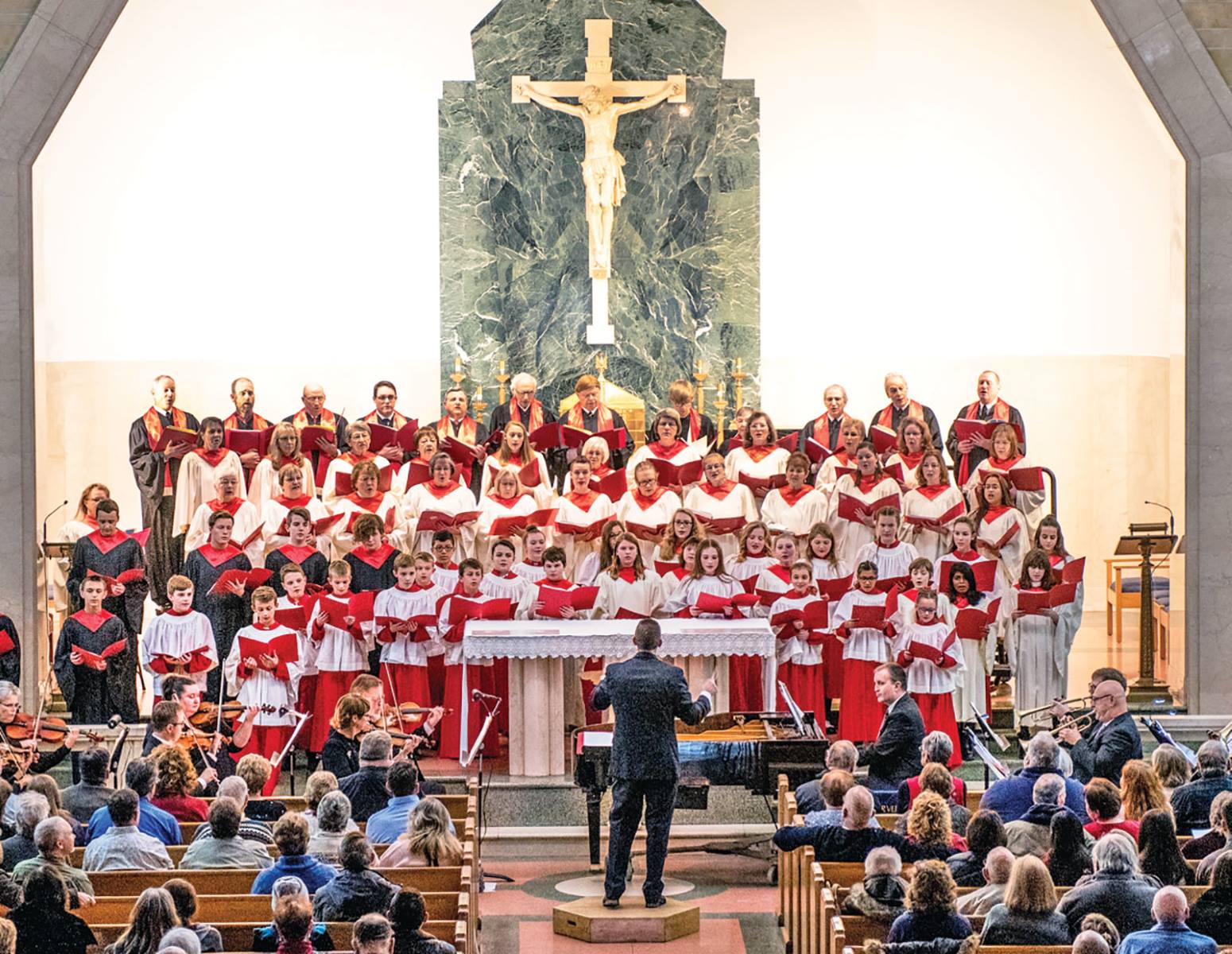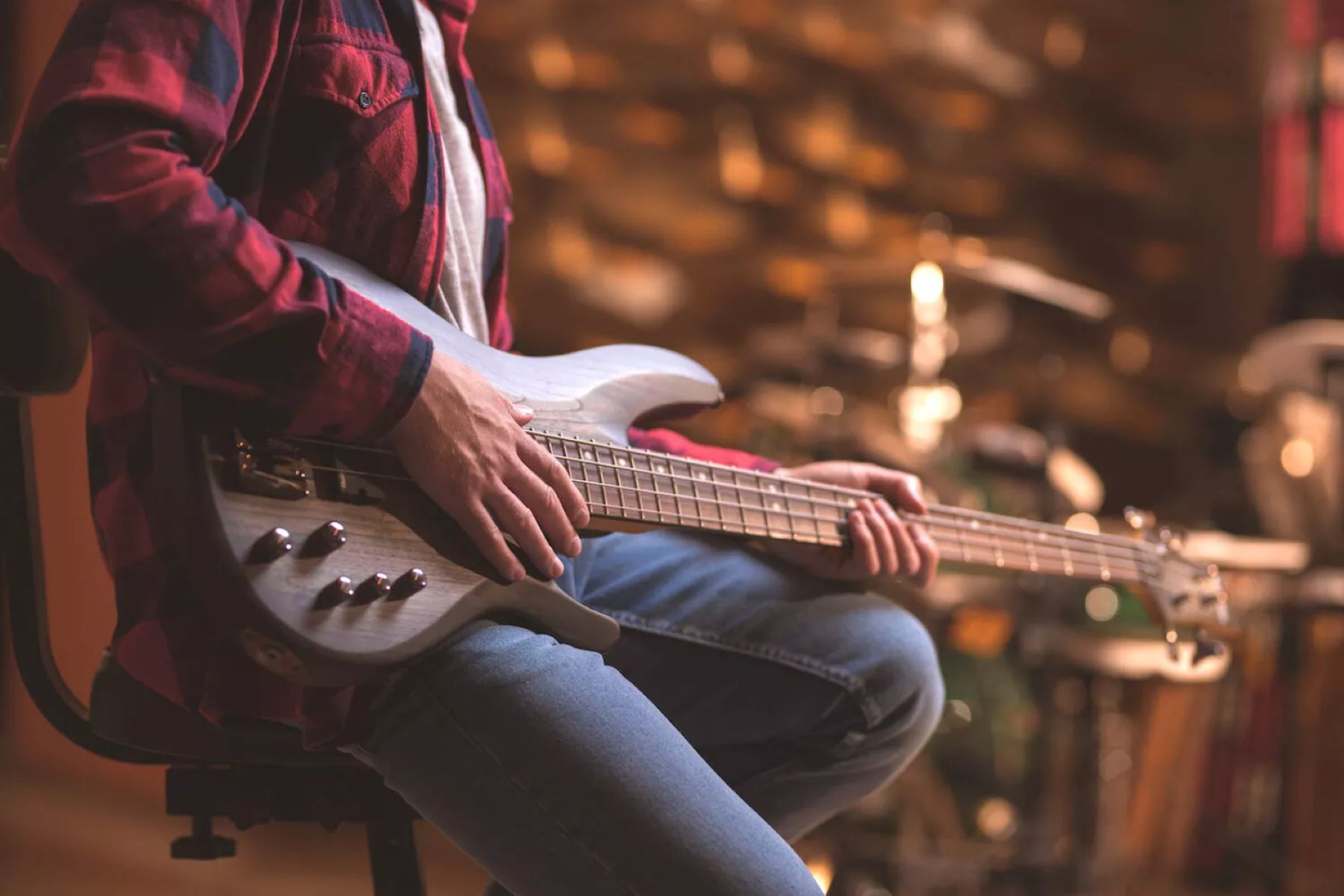Home>Production & Technology>Musician>How To Grow As A Musician


Musician
How To Grow As A Musician
Modified: January 31, 2024
Learn how to grow as a musician and unlock your full potential in the music industry. Discover effective strategies, tips, and resources to enhance your musical journey.
(Many of the links in this article redirect to a specific reviewed product. Your purchase of these products through affiliate links helps to generate commission for AudioLover.com, at no extra cost. Learn more)
Table of Contents
Introduction
Welcome to the world of music! Being a musician is an incredible journey filled with creativity, passion, and self-expression. Whether you’re just starting out or already well into your musical career, there’s always room to grow and evolve as an artist. In this article, we’ll explore several key strategies and tips to help you expand your skills and reach new heights as a musician.
Music, in its various forms, has the power to transcend barriers and connect people on a deep emotional level. As a musician, you have the unique ability to create meaningful and impactful experiences through your craft. However, the path to musical growth is not always easy. It requires dedication, discipline, and a willingness to step out of your comfort zone.
Whether your goal is to become a professional musician, perform on stages around the world, or simply indulge in your love for music, the principles laid out in this article will help you navigate the journey and maximize your potential.
So, let’s dive in and discover how to unlock your fullest musical potential!
Set Clear Goals
Setting clear goals is essential for any musician looking to grow and improve. Without a direction, it can be easy to feel lost or stagnant in your musical journey. When setting goals, it’s important to make them specific, measurable, achievable, relevant, and time-bound (SMART).
Start by asking yourself what you want to achieve as a musician. Do you want to master a specific instrument? Write your own songs? Perform at larger venues? Once you have a clear vision, break it down into smaller, actionable goals that are easier to work towards.
For example, if your goal is to learn a new instrument, you can set smaller goals such as practicing for a certain amount of time each day or mastering a specific song within a given timeframe. These smaller goals will help you stay focused and motivated along the way.
Remember to periodically review and reassess your goals as you progress. As you achieve one goal, set new ones that will continue to challenge and push you forward. This constant cycle of setting and achieving goals will fuel your growth as a musician.
Additionally, don’t be afraid to dream big and think outside the box. While it’s important to set realistic goals, don’t limit yourself to what you think is possible. Allow yourself to dream and aim for bigger and bolder aspirations. With dedication and hard work, you can surprise yourself with what you can accomplish.
By setting clear goals, you bring purpose and direction to your musical journey. It gives you something to strive for and keeps you motivated. So take the time to define your goals and start working towards them today!
Practice Consistently
Consistent practice is the bedrock of musical growth. It’s not enough to simply pick up your instrument or sit down at the piano once in a while. To truly improve as a musician, you need to establish a regular practice routine and stick to it.
Allocate dedicated time each day for practice and treat it as a non-negotiable commitment. This consistency will help you build muscle memory, develop a strong technical foundation, and refine your musical skills. Whether it’s scales, exercises, or practicing specific pieces, make sure to practice with intention and focus.
Break your practice sessions into manageable chunks, focusing on different aspects of your playing. If you’re a guitarist, for example, you might dedicate one session to finger exercises, one session to learning new chords, and another session to improvisation. This variety will keep your practice sessions engaging and well-rounded.
It’s also important to challenge yourself during practice. Push beyond your comfort zone and tackle difficult passages or techniques that you struggle with. This will help you grow and overcome any musical obstacles you may encounter.
Furthermore, consider recording yourself during practice sessions. Listening back to your recordings allows you to objectively assess your playing and identify areas for improvement. It also serves as a great way to track your progress over time.
Lastly, incorporate different practice techniques into your routine. Experiment with slow practice, where you play a piece at a slower tempo to focus on accuracy and precision. Explore mindful practice, where you cultivate awareness and attentiveness to every note and nuance in your playing. By diversifying your practice methods, you’ll reinforce your skills from different angles and develop a well-rounded approach to music.
Remember, consistency and deliberate practice are key. Even if you can only devote a short amount of time each day, the cumulative effect of regular practice will lead to significant growth over time. So, make practicing a priority and watch your musical abilities soar!
Expand Your Musical Horizons
As a musician, it’s important to continuously expand your musical horizons and explore different genres, styles, and techniques. By doing so, you not only broaden your musical palette but also gain valuable insights and inspiration that can fuel your growth as an artist.
Start by listening to a wide range of music. Explore different genres, from classical and jazz to rock and hip-hop. Pay attention to the intricacies of each style, understanding the unique characteristics that define them. This exposure to diverse musical influences will help you develop a versatile and well-rounded approach to your own playing.
Don’t limit yourself to just listening; try to learn songs and play pieces from different genres. This allows you to experience different rhythms, chord progressions, and melodies firsthand, which can be invaluable in expanding your musical repertoire.
Additionally, consider taking lessons or workshops with musicians who specialize in genres outside of your comfort zone. Collaborating with and learning from musicians with different backgrounds and expertise can open up new creative possibilities and push your musical boundaries.
Explore different instruments as well. Even if you have mastered one instrument, learning to play a new instrument can provide a fresh perspective and enhance your understanding of music theory and composition. It can also spark new ideas and approaches in your own playing.
Expanding your musical horizons also extends to experimenting with different techniques and approaches within your primary instrument. Look for tutorials, online resources, or join a community of like-minded musicians who can teach you new tricks or expose you to unconventional playing styles.
Remember that growth comes from challenging yourself and stepping outside of your comfort zone. Embrace the unknown, be open to new experiences, and allow yourself to be influenced by a variety of musical sources. By expanding your musical horizons, you will continuously evolve as a musician, infusing new ideas and creativity into your art.
Seek Feedback and Critique
Feedback and critique are invaluable tools for growth as a musician. While it can be intimidating to open yourself up to criticism, seeking feedback from others can offer valuable insights and help you refine your skills and performances.
One of the best ways to receive feedback is to find a mentor or teacher who can provide guidance and constructive criticism. A skilled teacher can pinpoint areas of improvement specific to your playing, offer technical advice, and guide you in developing your musicality. They can also push you to reach new levels of proficiency and hold you accountable for your progress.
Aside from formal lessons, seek opportunities to perform in front of an audience. Whether it’s at open mic nights, local gigs, or even busking on the streets, performing live exposes you to different perspectives and reactions. Feedback from listeners can help you assess how your music is received and identify areas that need improvement.
Encourage friends, fellow musicians, and family members to provide honest feedback on your performances, recordings, or compositions. They can offer a fresh set of ears and provide insights that you might not have considered. It’s important to approach feedback with an open mind and a willingness to grow.
Joining or forming a peer group of musicians can also be beneficial. These communities provide a supportive environment where you can exchange ideas, collaborate, and give constructive feedback to one another. Sharing your work with fellow musicians who understand the craft can yield valuable perspectives and help you refine your musical approach.
When receiving feedback, remember to separate personal attachment from constructive criticism. Understand that criticism is not an attack on your talent or worth as a musician but an opportunity for growth. Embrace feedback as a chance to learn and improve, and always be open to new ideas and perspectives.
Ultimately, seeking feedback and critique allows you to develop a more objective view of your music. It helps you identify blind spots, refine your technique, and continuously improve. So, actively seek out feedback and embrace it as an essential part of your musical journey.
Collaborate with Other Musicians
Collaboration is a powerful way to expand your musical horizons and grow as a musician. By working with other musicians, you gain new perspectives, learn from different playing styles, and develop valuable skills in collaboration and creativity.
One of the benefits of collaborating with other musicians is the opportunity to learn from their expertise. Each musician brings their unique experiences and musical sensibilities to the table, which can inspire you to explore new techniques or genres. Collaborators may introduce you to different ways of approaching composition, improvisation, or arrangement, pushing the boundaries of your own musical capabilities.
Collaboration also allows you to develop your interpersonal and communication skills. It requires active listening, compromise, and adaptability. Learning to work in harmony with others helps to build empathy and improve your ability to blend and synchronize your playing with other musicians.
There are various ways to collaborate with other musicians. You can join a band, form a duo or trio, or participate in jam sessions. Online platforms also provide opportunities to collaborate with musicians from around the world, regardless of geographical limitations. By embracing collaborative projects, you foster a sense of community and create connections within the musical industry.
When collaborating, it’s important to approach the partnership with respect and open-mindedness. Be receptive to ideas and be willing to compromise for the sake of creating a harmonious sound. Embrace the opportunity to learn from each other and celebrate the unique contributions that each musician brings to the collaboration.
Collaboration not only facilitates musical growth but also exposes you to new audiences. By joining forces with other musicians, you tap into their fan base and broaden your reach. This cross-promotion can lead to new opportunities, including gigs, recording projects, and increased exposure.
Furthermore, collaborating with musicians from different backgrounds and genres can ignite your creativity and encourage you to think outside the box. It allows you to blend different styles and influences, resulting in a unique and fresh sound. These collaborations can lead to exciting musical discoveries and artistic breakthroughs.
So, seek out opportunities to collaborate with other musicians. Embrace the magic and synergy that comes from working together, and watch as your musical journey flourishes through shared creativity and inspiration.
Perform Regularly
Performing regularly is a vital aspect of musical growth. It offers a valuable opportunity to showcase your skills, build confidence, and connect with an audience. Whether it’s playing at local venues, open mic nights, or even hosting your own virtual concerts, regular performance experiences can have a profound impact on your musical development.
Performing live allows you to put your skills to the test and refine your stage presence. It helps you develop poise and confidence in front of an audience, honing your ability to connect with listeners and convey emotion through your performance. The more you perform, the more comfortable and poised you become, allowing your true musical expression to shine through.
Regular performances also offer a platform for experimentation and growth. Each performance provides an opportunity to test new techniques, explore different improvisations, and gauge audience reactions. It allows you to assess what works and what doesn’t, enabling you to refine your musical style and delivery over time.
Performing regularly also helps you build a repertoire of songs or compositions. It challenges you to continuously learn and add new material, expanding your musical arsenal. With each performance, you gain a deeper understanding of your own strengths and areas for improvement, allowing you to tailor your future practice and development accordingly.
Furthermore, performances foster a sense of connection with your audience. The exchange of energy and emotions during a live performance is incomparable. It allows you to witness firsthand the impact your music has on others, motivating you to further elevate your craft.
Additionally, performing regularly increases your visibility within the music community. It exposes you to potential collaborations, networking opportunities, and even potential fans or supporters. By consistently putting your music out there, you increase the chances of being noticed and opening doors for future career opportunities.
Remember that every performance is a chance to learn and grow. Embrace both successful performances and those that may not go as planned, as they provide valuable lessons and insights for your development as a musician. With time and practice, you will become a seasoned performer, captivating audiences with your musical abilities.
So, seek out opportunities to perform regularly, whether they are at local venues, online platforms, or even in intimate settings. Embrace the thrill and excitement of sharing your music with others, and watch as your confidence and musical growth soar.
Network and Connect with Industry Professionals
In the music industry, networking is key to expanding your opportunities and growing as a musician. Building connections with industry professionals can open doors to collaborations, performance opportunities, and valuable insights that can propel your music career forward.
One of the first steps in networking is to attend music events, conferences, and workshops. These gatherings provide a platform to meet fellow musicians, producers, promoters, and experts in the industry. Engage in conversations, exchange contact information, and stay connected with the people you meet. Building genuine relationships with industry professionals can lead to mentorship, guidance, and potential collaborations in the future.
Utilize online social platforms to connect with industry professionals as well. Join musician-related groups on social media, participate in online forums, and engage with others in the music community. This digital networking allows you to reach a broader audience and connect with professionals from all over the world.
When reaching out to industry professionals, be respectful of their time and value. Research their work and show genuine interest in their expertise. Personalize your interactions and demonstrate how you can mutually benefit from a connection or collaboration. Be proactive in building relationships, but remember to be patient and understanding if responses are delayed or not received.
Attending industry showcases and open mic nights can also be a great way to connect with professionals in person. Showcase your talent, mingle with attendees, and be open to feedback or opportunities that may arise. The more you put yourself out there, the higher the chances of meeting industry professionals who can help further your music career.
Developing relationships with industry professionals is not solely about what they can do for you. Networking is a two-way street, so be ready to support others in their endeavors as well. Collaborate with fellow musicians, promote their work, and offer your assistance whenever possible. Building a reputation as a supportive and dependable musician can lead to reciprocal support from those in the industry.
Lastly, consider seeking out a music manager or booking agent who can help you navigate the industry and connect you with valuable opportunities. These professionals have vast networks and can help you strategize and negotiate to maximize your music career growth.
Remember that networking is an ongoing process, and building meaningful connections takes time. Be genuine, trustworthy, and respectful in your interactions. Music industry professionals witness countless aspiring musicians, so standing out with your talent and professionalism is crucial.
By actively networking and connecting with industry professionals, you increase your chances of exposure, learning, and reaching new heights in your music career. So, take every opportunity to expand your network, forge meaningful connections, and collaborate with those who can help elevate your musical journey.
Embrace Failure and Learn from Mistakes
Failure and mistakes are an inevitable part of any musician’s journey, but rather than being discouraged by them, it’s important to embrace them as valuable learning experiences. Learning from your failures and mistakes is a crucial step toward growth and improvement in your musical career.
First and foremost, it’s important to understand that failure is not a reflection of your worth or talent as a musician. It’s simply a stepping stone on the path to success. Every great musician has faced setbacks and made mistakes along the way. The key is to view these failures as opportunities for growth rather than a reason to give up.
When you encounter a setback or make a mistake, take the time to reflect on what went wrong and why. Was it a technical error? A lack of preparation? Analyzing your mistakes with an objective and open mind allows you to identify areas that need improvement.
Instead of dwelling on the failure, focus on what you can learn from it. Use it as a chance to refine your skills, strengthen your weak points, and develop new strategies for improvement. In fact, some of the greatest breakthroughs in music have come from taking risks, making mistakes, and learning from them.
Seek feedback from trusted mentors, teachers, or fellow musicians who can provide constructive criticism. Their guidance can help you recognize blind spots or provide different perspectives on how to approach your music. Embrace this feedback with humility and a willingness to grow.
It’s also important to maintain a growth mindset. Understand that mastery in music is a continual process and that there will always be room for improvement. Embrace the journey of learning and understand that progress may not always be linear.
Furthermore, never be afraid to try new things or take creative risks. Innovation and exploration often emerge from pushing boundaries and stepping out of your comfort zone. Embracing failure as a natural part of the artistic process can provide you with the freedom to experiment and discover new musical possibilities.
Remember, the road to success is rarely without obstacles. Each failure or mistake is an opportunity to learn, adapt, and come back stronger. Embrace the process of growth, stay persistent, and view every setback as a chance to emerge as a better musician.
By embracing failure and learning from your mistakes, you develop resilience, expand your musical capabilities, and ultimately become a more well-rounded musician. So, don’t fear failure – embrace it as an essential part of your journey to musical excellence.
Stay Dedicated and Motivated
As a musician, staying dedicated and motivated is essential for long-term growth and success. The path to musical excellence requires persistent effort, self-discipline, and a passion for honing your craft. Here are some strategies to help you stay committed and motivated on your musical journey.
First and foremost, set clear goals and remind yourself regularly of why you started making music in the first place. Whether it’s the joy of creative expression, the desire to connect with others, or the pursuit of mastery, having a clear sense of purpose fuels your dedication and drives you forward when faced with challenges.
Establish a consistent practice routine that suits your schedule and commitments. Regular practice not only helps you improve your technical skills but also maintains your momentum and progress. Set aside dedicated time each day or week and treat it as non-negotiable, just like any other important appointment.
Stay inspired by listening to a wide range of music, attending live performances, and exploring different genres and styles. Surround yourself with the work of other musicians who inspire you and study their techniques and approaches. This exposure to music stimulates your creativity and fuels your passion for continuous growth.
Find support and accountability through a community of fellow musicians. Join local music groups, online forums, or social media communities where you can connect with like-minded individuals. Share your progress, seek advice, and celebrate milestones together. Having a supportive network can provide encouragement and motivation during challenging times.
Celebrate your achievements, no matter how small. Acknowledge and reward yourself for reaching milestones or overcoming obstacles. These celebrations reinforce your progress, boost your confidence, and fuel your motivation to keep pushing forward.
Embrace challenges as opportunities for growth rather than seeing them as obstacles. Remember that each difficulty you encounter is a chance to learn and improve. Stay resilient and maintain a positive mindset when faced with setbacks.
Continuously seek inspiration and new learning opportunities. Take lessons from experienced musicians, attend workshops or masterclasses, and explore online tutorials and resources. Expand your musical knowledge and skills to keep your journey fresh and exciting.
Take care of yourself both physically and mentally. Maintain a healthy lifestyle that includes regular exercise, proper nutrition, and sufficient rest. A healthy body and mind ensure that you have the energy and mental focus to pursue your musical goals.
Lastly, find joy in the process. Remember that music is not just about reaching a destination but also about enjoying the journey. Embrace the ups and downs, the breakthroughs, and the plateaus. Celebrate your unique artistic expression and find fulfillment in the act of creating music.
By staying dedicated and motivated, you cultivate a mindset of continuous improvement and unlock your full potential as a musician. Stay committed to your musical journey, nurture your passion, and let the joy of music be your constant source of inspiration.
Conclusion
Congratulations on embarking on your journey as a musician! As you continue to grow and evolve in your craft, remember that the key to success lies in setting clear goals, practicing consistently, expanding your horizons, seeking feedback, collaborating with others, performing regularly, networking with industry professionals, embracing failure, and staying dedicated and motivated.
By setting specific and measurable goals, you give yourself a roadmap to follow, keeping you focused and motivated along the way. Consistent practice allows you to develop your skills, while expanding your musical horizons exposes you to new ideas and influences.
Feedback and critique from mentors, teachers, and fellow musicians are invaluable for improvement, and collaboration with others offers fresh perspectives and opportunities for growth. Regular performances sharpen your stage presence and allow you to connect with audiences, while networking with industry professionals opens doors to new possibilities.
Remember that failure and mistakes are part of the learning process, and by embracing them, you can gain valuable insights and develop resilience. Stay dedicated and motivated, maintaining a growth mindset and finding inspiration in your musical journey.
Above all, enjoy the process and the joy that music brings. Embrace your unique musical expression and nurture your passion. Each step forward is a step towards becoming the musician you aspire to be.
So, keep striving, keep pushing yourself, and never stop exploring the vast world of music. Your dedication and hard work will continue to shape you into the musician you aspire to be. The possibilities in the world of music are endless, and with the right mindset and strategies, you can unlock your full potential and make your mark in the musical landscape.











